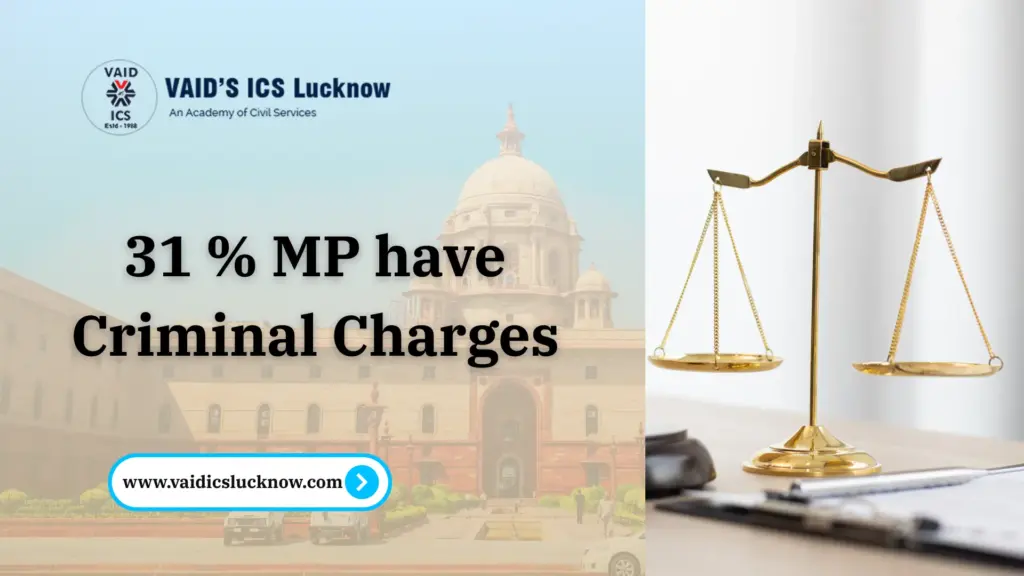August 26, 2025
31 % MP have Criminal Charges
Why in the News?
The same is also true in the case of Members of Parliament (MPs) and Members of Legislative Assemblies (MLAs) in India; as per an analysis conducted recently, a substantial number have grave criminal charges against them. The data has been collected after the recent parliamentary and state assembly elections and shows that 31 percent of the MPs and 29 percent of MLAs have reported serious criminal cases against them. This places doubt over the criminalization of India politics and whether more strict lines need to be drawn upon those who become elected representatives.
Key News Points: Criminal Charges on MP
- Definition of Serious Criminal Charges: These include offenses with a maximum punishment of five years or more, or those classified as non-bailable.
- Lok Sabha Trends: The share of MPs facing serious criminal charges has increased significantly, rising from 14% in 2009 to 31% in 2024, highlighting a surge in criminalization within Parliament.
- State Assemblies: Approximately 29% of MLAs (over 1,200 individuals) faced serious criminal charges in 2024.
- State-wise Data:
Telangana recorded the highest share of MPs with serious criminal charges at 71%, followed by Bihar at 48%.
Uttar Pradesh recorded the highest count of MPs with such cases, amounting to 34.
Andhra Pradesh had the largest proportion of MLAs with serious cases at 56%, followed by Telangana with 50%. Uttar Pradesh had the highest absolute number of MLAs (154, or 38% of its total).

Party-wise Breakdown:
- Among BJP representatives, 63 MPs (about 26%) and 436 MLAs (also 26%) have declared serious criminal cases.
- Congress: 32 MPs (32%) face serious charges.
- Smaller Parties: Of the Rashtriya Janata Dal (RJD), four MPs have severe cases, 62 percent of its MLAs. TDP: Approximately 61 percent of the legislators in the Telugu Desam Party have serious criminal cases against them.
- Caveat: The analysis reflects data immediately after the most recent elections and may not fully represent the current composition of MPs and MLAs.
Constitutional Provisions:
- Article 102 (Disqualifications for Membership of Parliament): Members of parliament can be disqualified under Article 102(1)(e) that is read in conjunction with the Representation of the People Act, 1951, in case of them committing certain crimes. Section 8 sets disqualification provisions on conviction of certain crimes where the crimes carry terms of imprisonment of 2 years or over (except minor offenses).
- Article 191 (Disqualification of State Legislatures): Equivalent and similar provisions exist in regard to MLAs, whose disqualification occurs after being convicted by the Representation of the People Act of 1951.
- Judicial Precedents: The Supreme Court in a case such as the Lily Thomas vs. Union of India(2013) held that M.P.s/M.L.A.s who have been convicted of crimes carrying a term of jail of two years or more stand immediately disqualified and there is no need to wait till the appeals are heard so as to curb the influence of criminality in politics.
- Election Commission Guidelines: Under the guidelines of the Election Commission, the candidates have to list pending and convicted criminal cases in their nomination papers (Form 26) in order to be transparent.
- Limitations: Disclosure is compulsory but there is no straight restriction on candidates undergoing cases to contest elections unless one is found guilty. This has elicited controversy on whether the Representation of the People Act should be amended to disqualify candidates that have serious pending charges.
October 6, 2025
September 24, 2025
September 23, 2025
September 22, 2025

